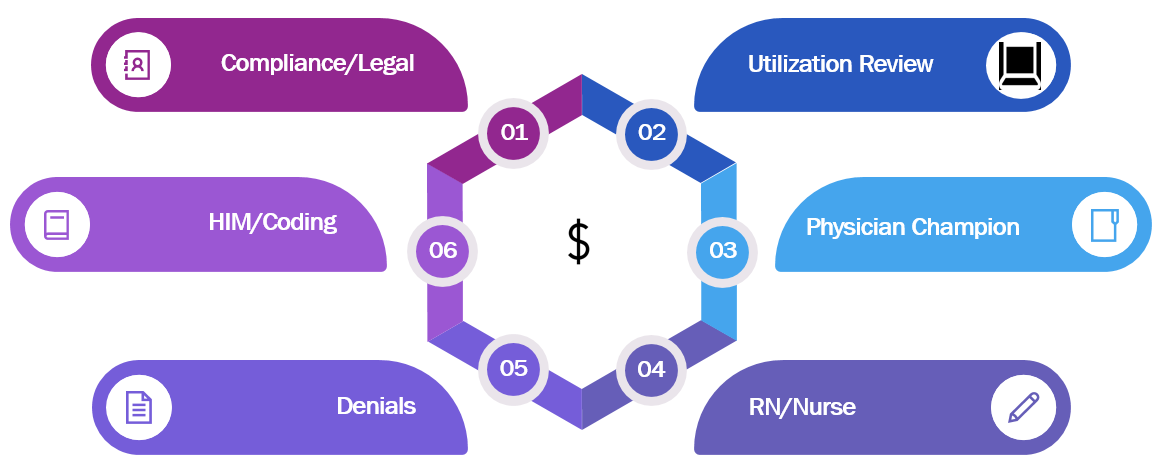Revenue Integrity
Revenue Integrity Team
Multidisciplinary Collaboration Approach

Once referred to as “revenue optimization,” the term “revenue integrity” is a more holistic term that also includes legal and contractual compliance. The process of ensuring revenue integrity falls within the scope of your revenue cycle management efforts.
People, processes, and platforms all help establish and maintain revenue integrity. By proactively addressing the issues that impact your revenue integrity, you’ll also improve your organization’s overall financial performance!
The goal of revenue integrity, according to the National Association of Healthcare Revenue Integrity (NAHRI), “is to prevent recurrence of issues that can cause revenue leakage and/or compliance risks through effective, efficient, replicable processes and internal controls across the continuum of patient care, supported by the appropriate documentation and the application of sound financial practices that can withstand medical coding audits at any point in time.”
Think of revenue integrity as a sort of bridge – it helps connect clinical, coding, compliance efforts across your overall revenue cycle operations. Once you begin implementing certain processes and following best practices, your efforts will drive improved financial performance across the enterprise.
The charge reconciliation process is an absolute necessity because it ensures accurate charge capture at the point of care. Due to the complexity of care delivery as delivered across multiple departments and systems, charge capture is also a major source of potential revenue leakage. As such, the best practice is to ensure charge reconciliation on a daily basis.
A recent report discussing upcoming 2024 healthcare IT trends found that providers are planning major investments in revenue cycle management technologies like revenue integrity and charge capture to enhance collections and streamline labor-intensive processes. The same report also highlighted the need for AI and automation to demonstrate productivity gains in revenue cycle workflows without increasing clinical risk.
Medical Practice Success can help healthcare organizations achieve daily charge reconciliation and prevent revenue leakage through automated charge capture and revenue integrity analysis often using the current emr tool you already have. By implementing rules-based logic, many software systems have built in solutions that can identify charge errors and compliance risks for human review before claims submission. Should your tool not have this capability, we have a solution that can be scaled to fit your organization. This level of automation delivers the productivity gains highlighted in the Bain report.
A common challenge for providers is that they lack a comprehensive manner to compile, assess, and validate charges at scale. Charge reconciliation is best managed at the department level, but this means staff will often have to spend several hours per day to generate and review reports for all charges around each patient encounter. Since many organizations current tools simply can’t comply with this requirement on a daily basis, charge inaccuracy is common, and the organization subsequently suffers from substantial revenue leakage. Having the right tools in place is critical to connect the Revenue (enhanced collections) and Cost (streamlined labor intensive processes) so that organizations can identify and mitigate potential losses.
Medical Practice Success would be happy to review your organizations Revenue Integrity program to look for areas of opportunity

